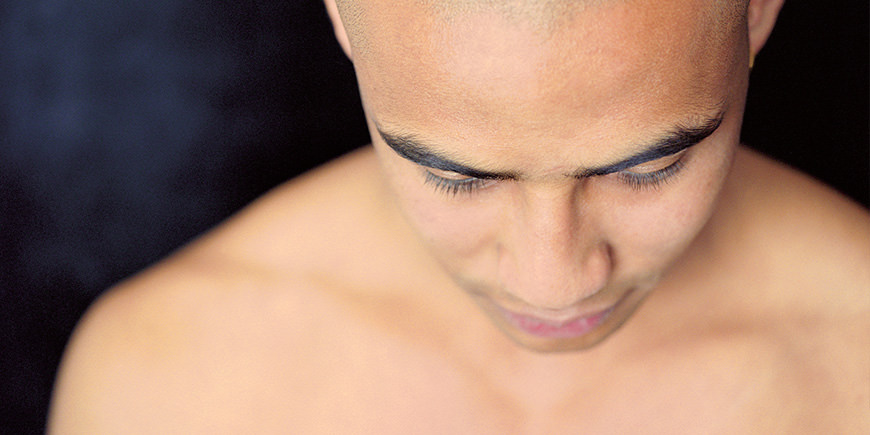When it comes to defining male pattern baldness, there remains far more questions than answers.
The process of understanding genetic hair loss is hardly aided by the sheer wealth of half-baked theories and hypothesis’, with suggested theories ranging from evolutionary cooling systems and the downward pull of gravity on the scalp.
While it’s fair to say that even the most fanciful theories have at least some grounding in logic and scientific research, the majority fall apart under intense scrutiny.
There are others that hold up a little stronger, however, including the assertion that the use of creatine can cause hair loss in adult males.
In the below article, we’ll explore this in more detail and ask whether or not creatine is a viable trigger for male pattern baldness.
What is Creatine?
Creatine is an organic acid that appears naturally within the human body. Its core purpose is to facilitate the recycling of adenosine triphosphate, which is the energy currency of muscle cells and those located in brain tissue.
As a result, creating plays a pivotal role in optimising muscle performance, increasingly your energy levels and boosting endurance during physical exercise.

Now, the issue is that the body’s natural creatine stores are minimal, so the creatine supplement was developed to boost these and increase the rate of protein synthesis.
It has proved exceptionally effective too, particularly at pulling water into muscle cells and providing additional energy during short-burst, high-intensity workouts.
These include circuit training and sprinting, with optimised creatine levels delivering a quick form of energy that enables you to get the most from your workout.
Creatine and the Bald Man – What have the Studies Show us so Far?
Now, while the use of creatine is perfectly safe and well-regulated, clinical studies have hinted that the supplement may have some side-effects.
Some trials revealed that the consumption of creatine supplements lefts them feeling sleepy and tired, and in some instances unable to complete high-intensity workouts.
This has been partially explained by the fact that the initial use of creatine causes your body to retain more water, leaving you feeling bloated and a little slower.
Similarly, some people have abnormally high levels of creatine in their body, and this can also have a counter-intuitive effect on the supplement.
Then we come to the suggestion that creatine supplements may be a trigger for male pattern baldness. Interestingly, there is some validity to this claim, although the clinical data requires further validation and it’s also arguable that the initial findings have been misinterpreted to some degree.
The science here is at least proven, with creatine having been implicated in increasing DHT (Dihydrotestosterone).
Individuals who are highly sensitive to the presence of DHT in their body are prime candidates for developing male pattern baldness, so there is at least a clearly-defined correlation here that is hard to ignore.
In the one clinical trial that has been completed to date, creating was found to increase the levels of DHT in the male form. The study, which was conducted on male rugby players, required subjects to take variable amounts of creatine on a daily basis, over a period of three weeks.
Not only did the use of creatine trigger higher levels of both testosterone and DHT, but those who took larger doses were also found to showcase the highest increases.
Now, it’s important to remember that these results have not been validated through a subsequent clinical trial, while similar studies have recorded mixed results in terms of creatine’s impact on DHT levels.
Still, the findings are worthy of consideration, particularly when you consider the status of DHT as significant component in premature hair loss.
In simple terms, the hypothesis states that taking regular doses of creatine will increase the levels of DHT in your body (most likely through the conversion of increased testosterone levels).
It’s then argued that this could act as a trigger for progressive hair loss, and the type of receding hairline that is synonymous with male pattern baldness.
And Now for the Truth – Can Creatine Really Cause Progressive Hair Loss?
There’s obviously some form of correlation here, but it would be wrong to suggest that taking creatine is a direct trigger for hair loss or male pattern baldness.

To understand this further, we need to look more closely at DHT, and how it actually contributes to the progression of hair loss in adult males.
The aforementioned study works on the premise that high levels of DHT are a key contributor to male pattern baldness. While there is some definite logic to this, it is countered by contrasting studies which have shown that there is often no correlation between levels of DHT and the onset of male pattern baldness.
So, while many individuals with high levels of DHT show no sign of hair loss, others with relatively low levels have experienced male pattern baldness.
Instead, those with male pattern baldness inherit hair follicles with an abnormally high level of sensitivity to DHT. This explains the widespread lack of correlation that exists between DHT levels and premature baldness, while it also respects the fact that there is a significant genetic component which contributes to male pattern baldness.
By redefining and clarifying the role of DHT in male pattern baldness, we must also reconsider how creatine may contribute to hair loss.
It certainly cannot be a direct trigger for hair loss, as while it may create higher levels of DHT in the human body this alone is not responsible for creating progressive, male pattern baldness.
Instead, it is each individual’s sensitivity to DHT to makes them predisposed to developing male pattern baldness, and this is an inherently genetic trait that is present from birth. So, for creatine to have any tangible effect on hair loss in adult males, they must first have a genetic sensitivity and receptiveness to DHT that develops a breeding ground for male pattern baldness.
The Last Word – Assessing the True Impact of Creatine on Progressive Hair Loss
In essence, there’s no tangible reason to suspect that creatine is a direct cause for hair loss or male pattern baldness. Even if we accept that this supplement creates higher levels of DHT in the human form, this alone is a not a contributing factor to acute or progressive hair loss.

It is fair to suggest that the excessive or frequent use of creatine could accelerate hair loss in individuals, however, so long as they were genetically predisposed to male pattern baldness in the first instance.
And while it’s unlikely that creatine itself causes hair loss, it may accelerate this process in those who are already susceptible to male pattern baldness.
So, if you have a family history of premature baldness or a receding hairline, you could find that sustained exposure to creatine supplements expedites the process of shedding hair around the crown and temples.
Interestingly, this means that ceasing to take creatine would do absolutely nothing to prevent the progression of male pattern baldness (even if it did slow the process slightly).
If you did want to delay this process further while continuing to take creatine regularly, you should instead focus on naturally regulating the action of the enzyme over time and potentially reducing the levels of DHT sensitivity around the hair follicles.
One way in which to achieve this is through diet, as when our bodies metabolise food that leave a residue that is known as metabolic ash or waste, with the former either acidic or alkaline in its nature depending on what type of food was initially consumed.
Now, previous studies have shown that eating vegetables, fresh fruits, herbs and raw nuts helps to creative alkaline conditions in the scalp, which regulated the enzyme that converts testosterone into DHT and actively reduces the progression of hair loss.
Make no mistake; this would not be able to prevent progressive hair loss or negate the genetic components that drive male pattern baldness. It would simply slow down the process over an indefinite period of time, much like the majority of other hair restoration procedures and techniques on the market.
With this in mind, it’s probably far better to embrace male pattern baldness and recognise its strong genetic triggers, before creating a new look that reflects your new-found reality!


Thank you my friend. Great article that was really helpful!